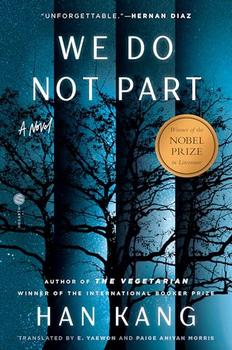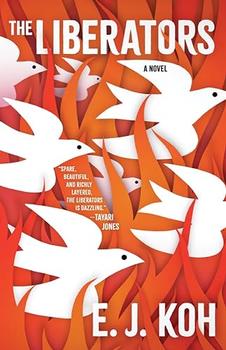Summary | Excerpt | Reviews | Beyond the book | Read-Alikes | Genres & Themes | Author Bio

A Novel
by Han KangWe Do Not Part, originally published in 2021 and now available in an English translation by e. yaewon and Paige Aniyah Morris, is the 11th novel of Han Kang, winner of the 2024 Nobel Prize in Literature. It illuminates a dark time in Korean history while following the friendship between two women. The story, told in three parts, opens with our main character, Kyungha. Recurring dreams have been haunting her for years, having started after she began research for a book about a massacre in a city she refers to as "G–" and continued even after the book's publication: "Having decided to write about mass killings and torture, how could I have so naively – brazenly – hoped to soon shirk off the agony of it, to so easily be bereft of its traces?" These dreams have seeped so deeply into Kyungha's life, despite her futile efforts to compartmentalize them, that they have resulted in her losing the people close to her, including her daughter. "I had parted ways with several people in my life," she says. "Some of these partings had been by choice, while others had caught me entirely unawares; I'd fought the latter with everything I had."
Spending her days alone in an apartment just outside of Seoul, Kyungha is agonized by a cycle of migraines, stomach spasms, and caffeine-rich painkillers. Failing to fight off despair, she works on writing her will, which she also refers to as her farewell letter: "I continued in the manner that those who left me had said they couldn't bear to witness." Out of the blue, she receives a text message from her friend Inseon, asking to meet her urgently. She complies, and learns Inseon has sawed off her fingers in a woodworking accident. Inseon asks Kyungha to look after her pet bird as she recovers in the hospital, before it dies of starvation and dehydration.
Kyungha agrees to care for the bird, Ama. However, Inseon's home is located miles from the nearest bus stop, and a harrowing and suspenseful journey in a blizzard awaits Kyungha, followed by a jumbling of reality and dream, past and present. The novel explores the treasure of friendship and love, and uncovers the distressing and haunting truth of the Jeju massacre (see Beyond the Book), showcasing the importance of memory in the process.
We Do Not Part impressed me with its accessibility. Within the first chapter, I felt fitted into the story alongside Kyungha and immersed in her life. Kang's strength lies in her ability to create vivid imagery that makes the characters seem real, and the stakes are set high through Kyungha's physical experiences: suffering from her body drenched in sweat due to sweltering heat or her jaw chattering from bone-chilling cold. Snow could be seen as the third character in the story with its prominence throughout — from its lightness and beauty to its connection to death: "That day, she came to understand something clearly. That when people died, their bodies went cold. Snow remained on their cheeks, and a thin layer of bloody ice set over their faces."
The prose is a blend of poetic and straightforward, offering appeal to a wide range of readers, but what keeps the story moving forward is the unmasking of realities behind the Jeju uprising. The first part primarily focuses on Kyungha's travels, while the second dives deep into the massacre, and the third attempts to provide some closure as we reckon with what we've learned. Kang doesn't shy away from the painful details of history but still creates a tone that doesn't feel too depressing. This is a story that teems with hope and resilience while uncovering a nation's painful past and profound loss, showing how people find ways to survive and live with tragedies.
Kang's writing takes on a hallucinatory effect as we question whether we can believe or trust what Kyungha is experiencing, from the opening chapter to her arrival at Inseon's home: "When someone who hasn't slept soundly in a while, who is stumbling through a period of nightmares blurring with reality, chances across a scene that defies belief, they may well initially doubt themselves. Am I actually seeing this? Surely this must be part of my nightmare? And: How much can I trust my own senses?" This creates ambiguity that might result in feelings of disconnection for some. It didn't dampen my reading experience, as I was invested in learning about Kyungha and Inseon's friendship, and the history of Jeju, where Inseon was born. Details of the massacre are gradually uncovered through fictional news clippings, memories passed down from Inseon's mother, and descriptions of items found among family belongings. The storytelling should be effective for readers open to living with slow pacing and some confusion.
Kang delivers a narrative that immerses us in Korea's history, filled with pain, trauma, secrets, sacrifice, love, and resilience. We eventually learn that Inseon's accident happened while she was working on a project Kyungha had asked for her help with, called We Do Not Part. It was an attempt to recreate the imagery in Kyungha's dreams: "the white snow over the plain, the seawater pushing in through the black trees." The project and its appearance in the book's title reflect the connection between Inseon and Kyungha, between Inseon and her mother, between a person and their history. Even as time goes by, and distance and complications are put between family, friends, community, and the past, we do not part from each other, and where we have come from — what bonds us is too strong.
![]() This review
first ran in the February 12, 2025
issue of BookBrowse Recommends.
This review
first ran in the February 12, 2025
issue of BookBrowse Recommends.

If you liked We Do Not Part, try these:

by Heinz Insu Fenkl
Published 2023
A "mesmerizing" (PW, James McBride) "magnificent" (Ha Jin) intergenerational coming-of-age novel set in South Korea—about friendship, belonging, and displacement.

by E.J. Koh
Published 2023
Extraordinarily beautiful and deeply moving, The Liberators is an elegantly wrought family saga of memory, trauma, and empathy, and a stunning testament to the consequences and fortunes of inheritance.
Everywhere I go, I am asked if I think the university stifles writers...
Click Here to find out who said this, as well as discovering other famous literary quotes!
Your guide toexceptional books
BookBrowse seeks out and recommends the best in contemporary fiction and nonfiction—books that not only engage and entertain but also deepen our understanding of ourselves and the world around us.